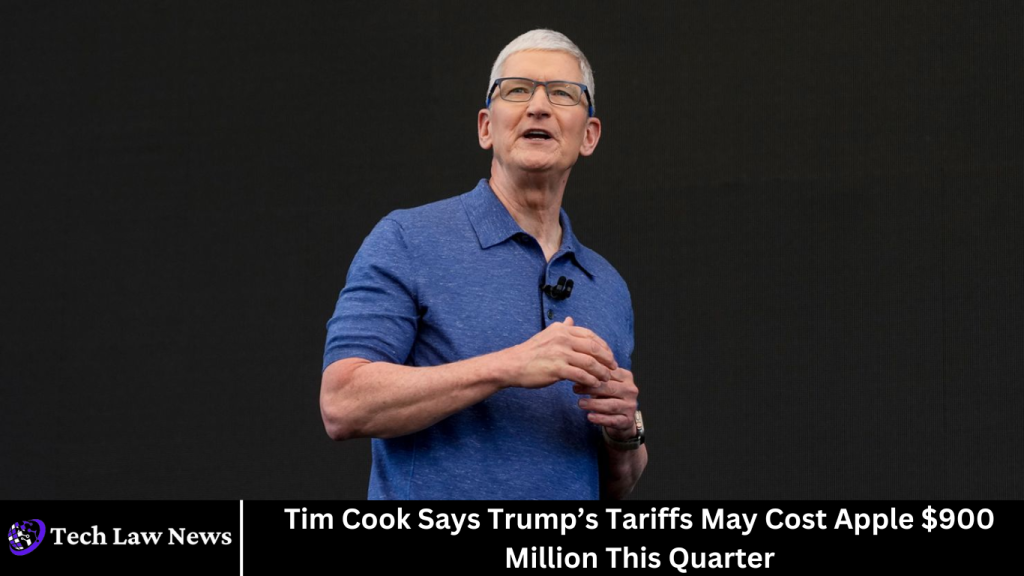Apple Inc. is facing significant financial challenges due to new tariffs imposed by the Trump administration. CEO Tim Cook has warned that these tariffs could add approximately $900 million to the company’s costs in the current fiscal quarter.
This development has prompted Apple to implement strategic measures to mitigate the impact, including diversifying its supply chain and investing heavily in U.S. manufacturing.
More Read: Tim Cook Says Trump’s Tariffs May Cost Apple $900 Million This Quarter
The $900 Million Tariff Impact
The Trump administration’s recent escalation of tariffs, including a 125% levy on Chinese imports, has directly affected Apple. Despite efforts to diversify manufacturing, a significant portion of Apple’s products are still produced in China.
The $900 million in additional costs for the current quarter underscores the substantial impact of these tariffs on Apple’s financial performance.
Strategic Responses: Diversifying the Supply Chain
In response to the tariffs, Apple has accelerated its efforts to diversify its manufacturing base. The company has increased production in India and Vietnam, with plans to have the majority of U.S.-bound iPhones manufactured in India this quarter.
Additionally, Apple is investing $500 billion over four years to expand its U.S. operations, including building new facilities and creating 20,000 jobs.
Financial Performance Amid Challenges
Despite the tariff-related challenges, Apple reported stronger-than-expected earnings for the fiscal second quarter, with revenue rising 5.1% to $95.36 billion and net income growing 4.8% to $24.78 billion. However, the company’s stock experienced a decline due to concerns over the impact of tariffs and legal challenges to its services business.
Investor Reactions and Market Outlook
Investors have expressed concerns about the potential long-term impact of the tariffs on Apple’s profitability. The company’s stock has seen a decline, reflecting apprehension about increased costs and potential disruptions to the supply chain.
Analysts are closely monitoring Apple’s strategies to mitigate these challenges and maintain its market position.
Frequently Asked Question
What specific products are affected by the tariffs?
The tariffs primarily impact products manufactured in China, including iPhones, iPads, and Macs. Apple is working to shift production of these products to countries like India and Vietnam to reduce tariff exposure.
How is Apple mitigating the impact of the tariffs?
Apple is diversifying its supply chain by increasing production in countries outside of China, such as India and Vietnam. The company is also investing heavily in U.S. manufacturing to reduce reliance on foreign production.
Will consumers see price increases due to the tariffs?
While Apple has not announced specific price increases, the additional costs from tariffs could potentially lead to higher prices for consumers if the company chooses to pass on the costs.
How significant is Apple’s investment in U.S. manufacturing?
Apple has announced a $500 billion investment over four years to expand its U.S. operations, including building new facilities and creating 20,000 jobs. This represents a significant commitment to domestic manufacturing.
What is the current status of Apple’s stock?
As of the latest reports, Apple’s stock has experienced a decline due to concerns over tariffs and legal challenges. Investors are closely watching the company’s strategies to address these issues.
Investor’s Business Daily
How are legal challenges affecting Apple’s services business?
Apple is facing legal challenges related to its App Store practices, including a U.S. judge ruling that the company violated orders on allowing alternative payment methods. These challenges could impact the company’s services revenue.
Investor’s Business Daily
What is Apple’s outlook for the next quarter?
Apple projects low-to-mid single-digit revenue growth for the third quarter, depending on global economic stability. The company is focusing on mitigating the impact of tariffs and legal challenges to maintain its financial performance.
Conclusion
Apple CEO Tim Cook has announced that tariffs imposed by the Trump administration are projected to increase the company’s costs by approximately $900 million in the April-to-June 2025 quarter. This estimate is based on current global tariff rates and assumes no changes in trade policies during the quarter. While this added cost represents less than 1% of Apple’s $95.4 billion quarterly revenue, it underscores the financial impact of ongoing trade tensions. mTo mitigate these effects, Apple has been diversifying its supply chain. The majority of iPhones sold in the U.S. this quarter are expected to be manufactured in India, while nearly all iPads, Macs, Apple Watches, and AirPods will be produced in Vietnam. Despite these efforts, Apple remains vulnerable to tariffs, particularly those affecting products still manufactured in China.

